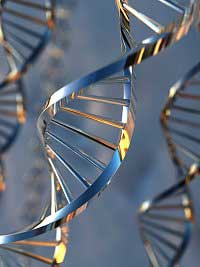Publication of human gene variant map
Scientists have created a kind of map of human genes. This is a step forward to find genes that explain differences in individual health and why people have different ways of responding to drugs and the environment.

The HapMap map promises to explain how your genome differs from the next genome.
The map also has the potential to help scientists better understand human biology, evolution and diagnosis of disease. An international team of scientists published the first part of this map in the Nature issue last week.
According to Dr. Panos Deloukas of the Wellcome Trust Sanger Institute , a project participant, this is an important scientific event because the map is directly related to the human genome and is an effective tool to enhance research. genetic.
The human gene project has shown that the genomes of any two people are 99.9% identical. Now scientists have completed a more detailed map (also called HapMap), showing genetic variations to explain 0.1% difference. This international HapMap Project, which brings together 200 scientists from the UK, USA, Canada, Japan, Nigeria and China, has created a human gene variant map using DNA samples from 269 people from Asia, Africa and America. The first part of HapMap contains more than 1 million variations. The second part will contain about 2 million more variants. These variations are inherited as information blocks.
Using HapMap, scientists can compare morphological patterns in patients with certain health problems to identify genetic causes of disease. According to Professor Peter Donneylly of Oxford University, HapMap is another tool for us to search for genes related to common diseases. It will also help people understand other important processes in biology, such as evolution, recombination and the effects that make up human gene variants.
In addition, the HapMap will allow scientists to conduct more detailed genetic studies. In particular, it has been revealed that genes involved in DNA repair are not as diverse as those that play a role in the body's immune response. Prof. Deloukas predicts that in 2-3 years there will be a lot of information from such studies.
Minh Son ( According to ABCNews, Reuters )
- Detailed publication of the map of human gene variants
- Gene decided 'household' bacteria
- 44 gene variants related to depression were discovered
- One-fifth of the world's population has smart, long-lived genes
- Detection of variant HLA-B gene that helps to block HIV
- Gene therapy helps aging the heart
- Publication of human gene map on the Internet
- The first complete map of human gene activity
- Scientists have found love genes
- Looking back at 10 years of publication of human gene map
- There is a kind of gene that makes some people crave adventure
- Strangely, black people have blond hair
 Why do potatoes have eyes?
Why do potatoes have eyes? 'Tragedy' the world's largest carnivorous life: Death becomes ... public toilet
'Tragedy' the world's largest carnivorous life: Death becomes ... public toilet Tomatoes were once considered 'poisonous' for 200 years
Tomatoes were once considered 'poisonous' for 200 years Detecting microscopic parasites on human face
Detecting microscopic parasites on human face